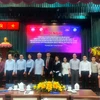
Can Tho (VNA) – Vietnam boasts significant advantages in artificial intelligence (AI) development, thanks to its market potential, skilled workforce, and startup ecosystem, international experts said at the GenAI Summit 24.
The event was co-organised on August 18 by the New Turing Institute (NTI), Rethink Healthcare Foundation (RHF), National Innovation Centre (NIC), and Fulbright University Vietnam, with support from the Ministry of Planning and Investment.
Vietnam positioned to lead AI innovation in region
At the summit, Nguyen Duc Toan, Google Cloud’s Country Director, noted that Vietnam is uniquely positioned to spearhead AI innovation in Southeast Asia and beyond. The country is receiving substantial support from the government and major local corporations such as Viettel and Vingroup to capitalise on the growing AI wave.
International collaboration is also advancing, with Google investing significantly in Vietnam’s future workforce by offering 40,000 “Google Career Certificates” scholarships and training 200 Vietnamese startups in AI through the Google AI Startups Masterclass programme, which aims to boost the AI startup ecosystem.
Dr. Luong Minh Thang, a senior researcher and manager at Google DeepMind and Co-founder of the New Turing Institute, highlighted the strong passion of Vietnamese students for mathematics, positioning them well to excel in the new era.
Vietnam’s strong educational tradition, particularly in mathematics and science, produces a high-quality workforce for the AI sector. Vietnamese students consistently excel in international math competitions, demonstrating the logical thinking and problem-solving skills essential for AI development.
According to the Ministry of Planning and Investment, Vietnam attracted over 1 billion USD in technology startup investments last year. The rapid growth of this startup ecosystem is comparable to that of Singapore and Malaysia. However, experts also noted challenges in building AI infrastructure and attracting talents, particularly in mathematics and science.
Wendy Uyen Nguyen, RHF Co-founder and President, underscored the urgent need for rapid AI education and training, especially in healthcare, where technology can have a significant impact. GenAI, for instance, could enhance medical fields, allowing doctors to focus on their specialties.
AI holds immense potential in revolutionising the sector, particularly in drug development and medical translation, she noted. Additionally, it can help reduce costs, accelerate research, and improve patient outcomes, providing more treatment opportunities for those living in rural areas.

A prime moment for AI development
Jeff Dean, Google’s Chief Scientist and Co-founder of Google Brain, Google Translate, and Gemini, stressed that AI applications must adhere to strict safety and reliability standards. He emphasised that AI developers have a responsibility to ensure systems are not only effective but also built on a strong ethical foundation.
To fully realise AI’s potential, Dean recommended that governments and tech companies invest in education and facilitate access to this technology for young talents.
Phung Viet Thang, Country Director of Business, Marketing, and Communications at Intel Vietnam, defined "unclear or lower-than-expected business outcomes" as a major challenge in AI implementation in the country. He advised businesses to not view it as an end goal but as a technology that provides methods and tools to achieve their objectives.
Thang also noted that Vietnam is at a golden moment to embrace the robust AI development trends in the coming years. By leveraging it to enhance product quality, optimise processes, and improve customer experience, the nation has the potential to revolutionise its approach to work and significantly boost its global competitiveness./.






















